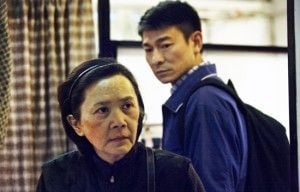Beyond Kung Fu: 5 Movies From Asia to Catch
Will the recent purchase of AMC theaters by a Chinese billionaire mean more Asian films in theaters? Likely not, but here are some to watch in the meantime
/https://tf-cmsv2-smithsonianmag-media.s3.amazonaws.com/filer/20120530031033I_Wish-thumb.jpg)
News last week that Wanda, a real estate company based in China, purchased AMC Entertainment has raised concerns in some quarters over a foreign incursion into the U.S. film industry. Based in Kansas City, AMC is the country’s second-largest film chain, operating 5,034 theaters. Founded by billionaire Wang Jianlin, Wanda operates 730 screens in China, and is also involved in production and distribution.
In The New York Times, reporter David Barboza calls the deal “risky,” in part because of AMC’s heavy debt load, but also because of the challenges Wang faces in making the Wanda Group a global brand. (Wang had ties to disgraced politician Bo Xilai, but he told the Times that they had “a working relationship,” not a personal one.) The billionaire has not ruled out purchasing theaters in Europe, although the bulk of his real estate empire consists of commercial developments, hotels, and resorts.
Will AMC begin screening more Chinese films? Yes, but not because of the Wanda deal. DreamWorks Animation is building a production studio in Shanghai in a joint venture with China Media Capital and the Shanghai Media Group. As I wrote earlier, Walt Disney and Marvel Studios are producing Iron Man 3 in China. Two weeks ago, the News Corporation, which owns 20th Century Fox, bought 19.9% of Bona Film Group, a China-based film distributor. So it’s simply a matter of time before more Chinese co-productions start reaching screens here.

Barboza raised a more interesting question: will the Wanda deal impact what movies AMC screens? Wang is sticking with AMC’s current management for the time being, and told the Times that he would not interfere with its decisions. But what if AMC tries to show a documentary supporting uprisings in Tibet? Or Ai Weiwei: Never Sorry, Alison Klayman’s documentary about the activist artist that is currently making the rounds of film festivals? How would Martin Scorsese’s Kundun (1997), based on the life of the 14th Dalai Lama and a source of contention between Disney and Chinese authorities, have fared?
Some viewers here might worry about an influx of Chinese propaganda, like the recent films celebrating Sun Yat-Sen (including 1911, Beginning of the Great Revival, and Bodyguards and Assassins). But Chinese moviegoers enjoy the same types of films we do here—often the same titles. Top grossers include comedies, romances, animation, and blockbusters. Kung Fu Panda and Madagascar 2 were big hits, as were the Transformers and Harry Potter series.
Unfortunately, very few of the movies made in China reach American theaters. I hope to write about this in more detail, but for now let me list some recent Asian productions that are available here.

1. Let the Bullets Fly (2010). Set in the 1920s, this genre mash-up is the all-time top-grossing Chinese production. Directed by Jiang Wen, the film describes what happens when a notorious bandit (played by Jiang), a corrupt governor (Ge You), and the local crimelord (Chow Yun Fat) battle each other over impoverished Goose Town. Jiang uses action and comedy (and some serious filmmaking skills) to drive home his political points, and finds the time to reference everyone from Sergio Leone to Mozart. Check out the brilliantly choreographed train robbery that opens the film, the equal of many big-budget Hollywood productions. All three leads will be returning in Jiang’s sequel. Available from Well Go USA Entertainment.

2. Love in the Buff (2012). A sequel to 2010′s Love in a Puff, this romantic comedy follows a mismatched couple from Hong Kong to Beijing. Grappling with new jobs, Cherie (Miriam Yeung) and Jimmy (Shawn Yue) struggle to maintain their passion for each other in a city full of temptations. The two met over cigarettes in the original film, forming a skeptical bond over shared humor and the laws of physics. Anyone who likes romances will be engaged by director Pang Ho-Cheung’s grasp of how relationships evolve and fail. Falling in love is the easy part: what’s hard is dropping your guard and making a commitment. The film has a breezy, cosmopolitan style—Beijing seems filled with glamorous nightclubs, restaurants, and expensive apartments—and an assured grasp of a present of iPads and text messages. Available from China Lion Entertainment.

3. Life Without Principle (2011). Without the infrastructure of Hollywood studios, producers in China can be more nimble, responding to events that can take years to work their way through Hollywood development hell. The great Hong Kong director Johnnie To built this drama around the Greek debt crisis. To examines the financial repercussions to a bank employee (Denise Ho), a minor crook (Lau Ching-wan), and an underpaid cop (Richie Jen), among others, weaving their stories into a world of greed and anxiety. The director draws out a scene in which Ho talks a retired widow into investing her savings in a risky stock until the suspense is unbearable. No release has been set yet for the U.S., but DVDs are available.

4. A Simple Life (2011). Directed by veteran filmmaker Ann Hui, and loosely based on producer Roger Lee’s life, A Simple Life explores the relationship between an upper-class accountant (Andy Lau) and a servant (Deanie Ip) who has devoted her life to his family. A blend of tears and humor, of memory and loss, the film details Ah Tao’s (Ip) decline after a stroke. She moves into an assisted living home, where Hui documents her inevitable decline with humor and sensitivity. Lau, one of the superstars in Asian culture, and Ip, his real-life godmother, work wonderfully together in a story that is both poignant and honest. Available from China Lion.
5. I Wish (2011). A ringer of sorts, I Wish is the latest film from the Japanese director Hirokazu Kore-Eda. In it two young brothers vow to meet overlooking a railway line where bullet trains passing in opposite directions meet—supposedly the point where wishes will come true. Kore-Eda is an excellent writer and editor, but his real skill is with actors. The two brothers here, Koki and Ohshiro Maeda, give remarkable performances, but so do the rest of the performers. Simple, funny, and heartbreaking, I Wish is an unforgettable coming of age story. Available from Magnolia Pictures.
/https://tf-cmsv2-smithsonianmag-media.s3.amazonaws.com/accounts/headshot/daniel-eagan-240.jpg)
/https://tf-cmsv2-smithsonianmag-media.s3.amazonaws.com/accounts/headshot/daniel-eagan-240.jpg)